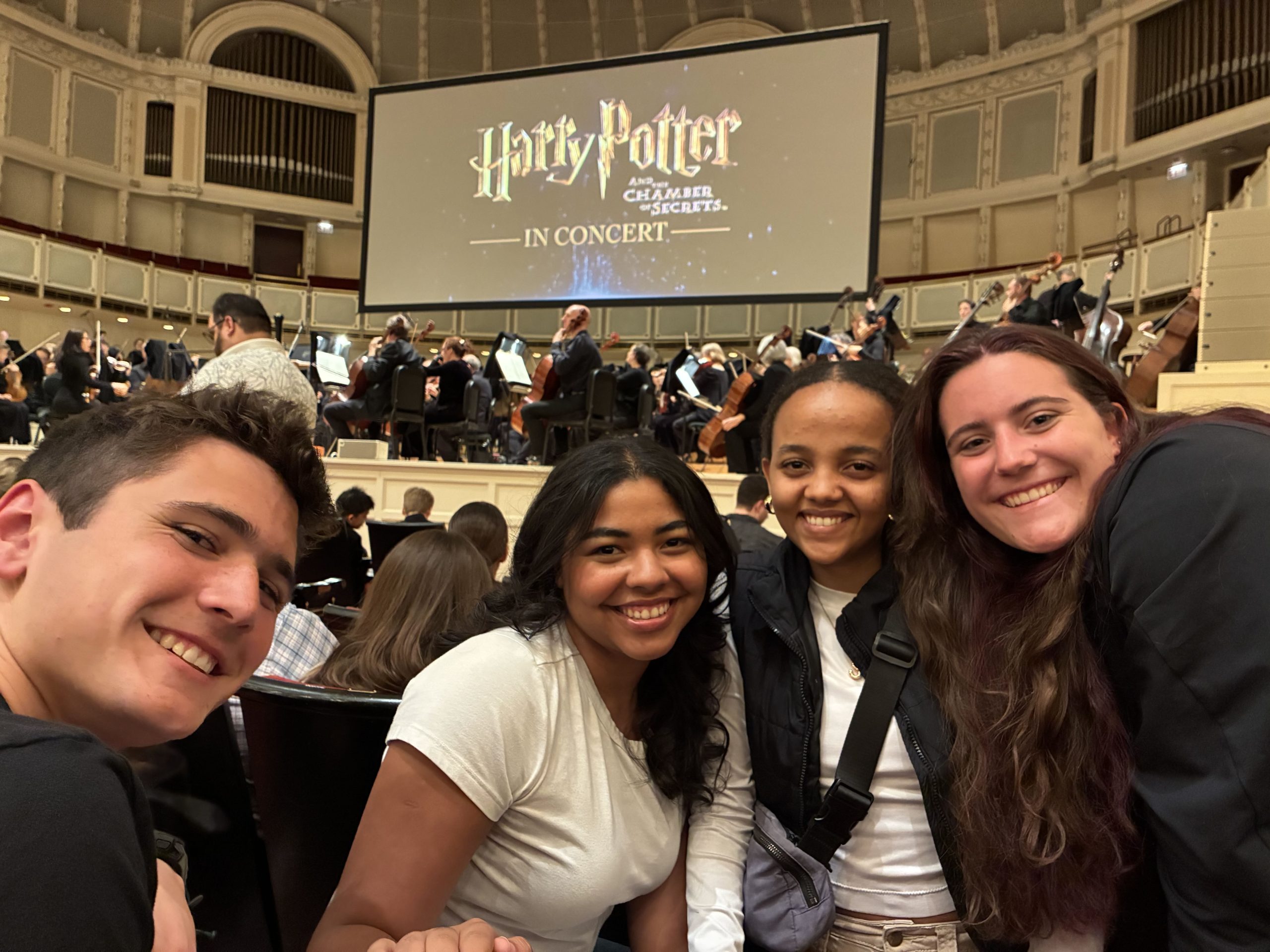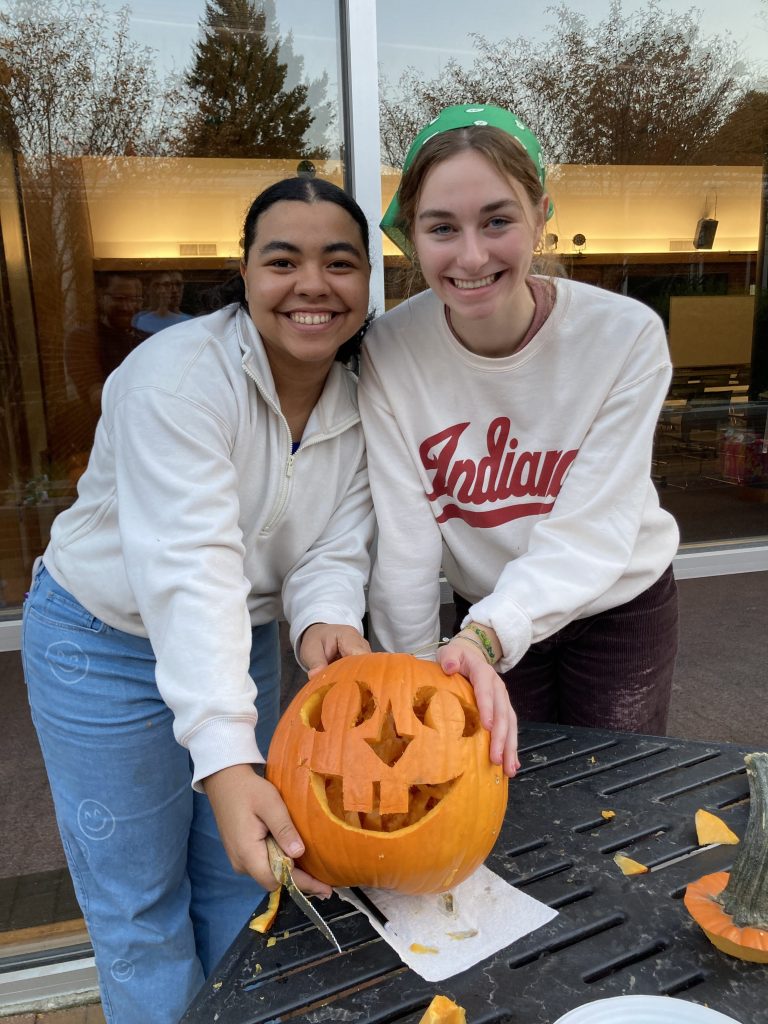President Rebecca Stoltzfus reappointed for a third term. Learn more
The Goshen College Board of Directors has unanimously reappointed President Rebecca Stoltzfus to a third term of five years.
President Rebecca Stoltzfus reappointed for a third term. Learn more

News
Aug 05 2025
One year ago, a group of 12 Goshen College first-years stepped into something entirely new: the first class of GC’s Honors Program, a new effort designed to give high-achieving and curious students a space for deep interdisciplinary study starting on day one of their college career.
As the Honors Program enters its second year, Goshen will welcome 15 new first-year Honors students, while allowing rising sophomores in the program to push their limits as writers and researchers, while engaging in complex, interdisciplinary discussions — not only within the cohort, but across campus.
The cohort felt cohesive and closely knit, yet simultaneously inclusive, says Robert Brenneman, honors director and professor of criminal justice and sociology.
“There is a lot of camaraderie and goodwill among the students,” Brenneman said. “But I haven’t seen an honors table in the cafeteria — it doesn’t seem clique-y.”
In addition to coursework, students in the program gather about once a month for unique activities such as a pumpkin carving contest or various trips. In March, students traveled to the University of Notre Dame Raclin Murphy Museum of Art and toured the Notre Dame campus as a means of thinking about graduate and professional schools.
Levi Moser, a sophomore environmental science major and the group’s elected president, agreed.
“When we’re doing things together, like the discussion in the class we all took, it’s really lively,” he said. “We had great input from everyone, and that was a delight.”
One of the group’s real strengths, according to Brenneman, was its diversity — not just ethnically and racially, but academically.
“I don’t think a single major has more than one student in the cohort,” Brenneman said. “That’s just by pure chance — but it’s what we were hoping for by designing a program to encourage interdisciplinary learning in a small seminar format.”
The students’ first honors course, Modernity and Spirituality, served as an introduction to college-level research while diving into philosophical and theological questions. Led by Philipp Gollner, professor of history, the class covered the Reformation to postmodernism, with a final project that required students to develop a thesis, conduct primary research and complete a structured revision process.
Gollner said that he enjoyed the wide arc of research topics that students chose for their final paper, as well as the class discussions, which he said happened in the “traditional history way: tables gone, sitting in a circle and discussing what we read.”
Moser described it as “the best [class] I’ve ever had for discussion.”
He said that with the variety of majors and the academic drive present, the class discussions were lively and relevant. “People were prepared and engaged, and that made me want to show up ready every day.”

Lívia Dias and Alina Bergstresser pose with their prize-winning pumpkin carving at an Honors social in October.
Over their next three years, the students will take a variety of courses with their cohort, graduating with a minimum of 15 honors credits. These include:
Students will also be required to demonstrate at least two semesters’ worth of leadership experience. This could include leading a club, mentoring, serving as a teaching assistant or many other opportunities.
Suzanne Ehst, GC’s associate academic dean, put it this way: “We hope what they’re doing in that honors space emboldens them to be academic leaders in their major, in their other courses and in their extracurriculars.”
That is the sentiment at the core of the program.
The goal of the Honors Program is not to separate certain students, but rather, to encourage anyone and everyone to push themselves and go deeper. As Brenneman put it, “it isn’t about pinning a ribbon on certain students. The idea is that these students, by being here and going deeper, radiate intellectual depth and curiosity through the student body.”
“Hopefully, it’ll be infectious,” Gollner chimed in.
As Ehst said, “A first-year student is not just a first-year student. There are so many different types of learners, each with different needs — and programming like this better recognizes that diversity.”
Ehst, who has experience in K-12 education, said that programs like this one have been instituted in many secondary schools as a measure for student equity — and Gollner agrees that the same concept translates to this college campus.
“Goshen has always had landing points for that kind of curiosity and vibrancy,” he said. “But it’s not been explicit about where those places are — for incoming students, or faculty, coming from another culture, that can be a harder thing to figure out.”
Gollner, who is Austrian, continued: “The Honors Program is an explicit landing place that opens the door to anybody who wants to apply.”
In a month, the rising sophomore cohort will begin a class called Are We Still Human? with Jessica Baldanzi, professor of English, discussing the ever-growing link between humans and technology, while a new first-year cohort will take Gollner’s Modernity and Spirituality.
“It’s going to be fascinating to watch how these students evolve over the next three years,” Ehst said.
For his part, Moser agreed, saying he was excited for the future.
“I’ve definitely been pushed, and I feel like that’s prepared me more for some of my other classes,” he said. “That paper was the biggest project I’ve ever done — but I’m glad I did it.”
“No complaints so far. It feels good to get it started — and I’m excited to see where it goes.”